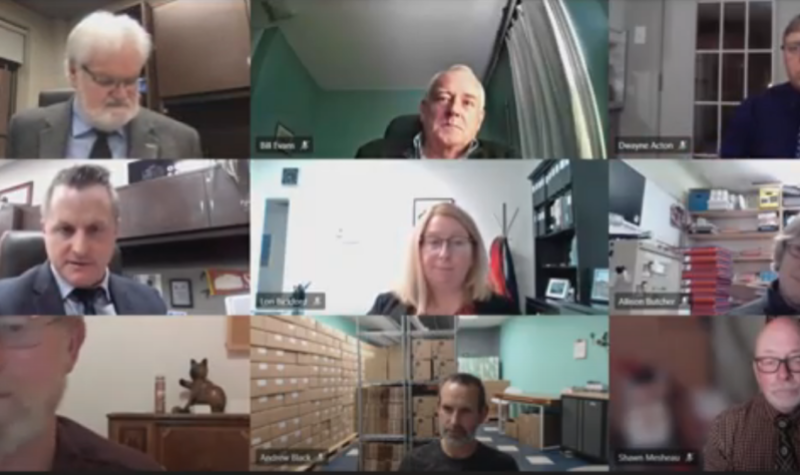Sackville town council has approved three municipal bylaw and plan changes that will make way for an abattoir to operate at 72 Crescent St. in the town’s industrial park.
Votes took place on second and third readings of the three required changes in the same meeting last night.
In the vote on the first of the three related motions, Coun. Michael Tower voted against, while Couns. Evans, Black, Mesheau and Butcher all voted in favour.
Coun. Bruce Phinney was absent due to a requirement to self-isolate at home after travel, and a lack of internet access at home.
By the time the third motion was being voted on, the votes were unanimously in favour.
Before that, councillors chimed in with questions about the proposed changes, and with comments explaining their positions.
Coun. Bill Evans spoke in favour of the proposed changes last month and last night, and commented that only two residents had gotten in touch with him to take about his position. Evans pointed out that much of the contention over the abattoir was related to different predictions of what its effects would be.
“It seems to me that what makes this case different from all other contentious issues we’ve faced–like demolishing buildings–is that it’s not about disagreeing about something that is definitely either/or. Rather, it’s about our prediction about what might happen,” said Evans.
“The people who object to the proposal think that this operation will negatively affect the quality of life as far away as downtown, and that smells and noises will be so bad that it will negatively affect residents hundreds of meters away, and result in a reduction to their property values,” said Evans. “I understand these concerns. And I understand the fear that comes with this uncertainty. But my task is to calmly and rationally evaluate the probability of this happening. And I’ve concluded that the probability is low.”
Evans went on to give two reasons he believes an abattoir on Crescent Street will likely not affect the surrounding community negatively. First, he said all parties, the proponent included, have an interest in the operation being attractive and successful. And second, other operations that he is familiar with did not turn out badly.
Coun. Michael Tower spoke against the motions, though specified his issue was with the location, not the proposal for an abattoir itself.
Tower expressed frustration over the lack of letters going to residents that live nearby, but beyond the 100 metres required notification zone for proposed zoning changes.
Tower also said that provincial and federal regulations of abattoirs did not take into account that they might be happening in urban areas.
Tower said he looked into other jurisdictions, like Ontario, BC and Alberta.
“They have abattoirs, but they also have the regulations behind them that it’s 500 metres away from another residential household,” said Tower. “And that’s quite a difference.”
“In one study in BC,” said Tower, “that was because of the odour and flies.”
Several local residents attended the meeting and asked questions during both question periods at the beginning and end of the meeting. One resident wondered about why property assessors were not consulted as part of the evaluation of the proposal, but planner Lori Bickford said that assessors will not share their rationale for determining property values.
Another wondered if the development agreement with Chris Pierce, which is part of one of the amendments passed last night, was subject to change. Bickford said only small grammatical changes can happen without another public process.
One resident also wondered whose opinion would matter when it came to smell.
“What are the controls?” asked Alice Cotton. “And how was that determined as to whether it smells for one person and not for another?”
Lori Bickford replied that concern for smells was taken into consideration when drawing up the development agreement.
“You’ll see within the development agreement,” said Bickford. “There are requirements that all activities have to be contained within the structure itself.”
“So there is no outdoor storage, there is no animals being penned outside. Those would be complete violations of the agreement, which would then result in the end of them, being in non-compliance with their zoning,” said Bickford.
“The other thing is public health is the licensing body that does oversee abattoirs within the province,” said Bickford. “And part of their licensing component is nuisance requirements, which would factor in the storage of materials as well as the smell component.”
Listen to this story on Tantramar Report, or here:


